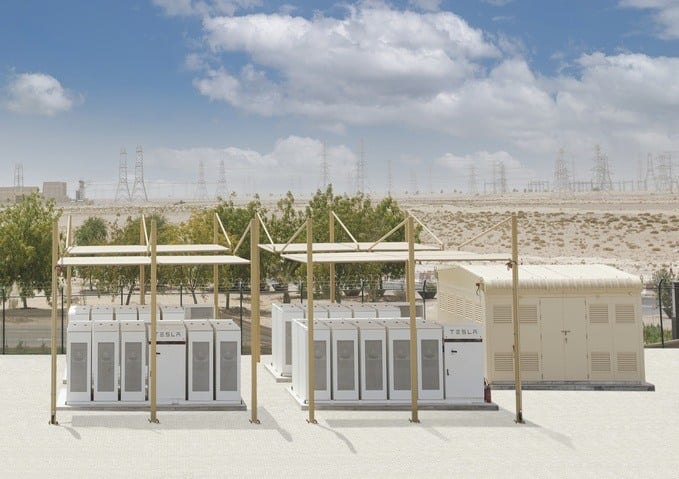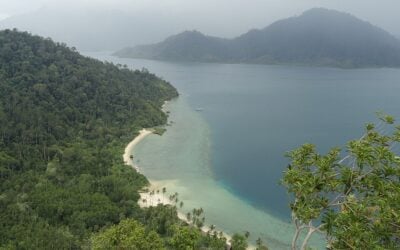
A Tesla battery energy storage system (BESS) pilot project has gone into service at what is currently the world’s biggest single-site solar PV plant, Mohammed bin Rashid Al Maktoum Solar Park.
The Dubai Electricity and Water Authority (DEWA) has inaugurated the project at its solar farm 50km south of Dubai in the United Arab Emirates, it said on Sunday 26 September. The ambitious Mohammed bin Rashid Al Maktoum Solar Park has already reached 1GW of solar generation capacity installed and with ongoing capacity expansions taking place could become five times that size by 2030.
Enjoy 12 months of exclusive analysis
- Regular insight and analysis of the industry’s biggest developments
- In-depth interviews with the industry’s leading figures
- Annual digital subscription to the PV Tech Power journal
- Discounts on Solar Media’s portfolio of events, in-person and virtual
The pilot utilises 1.21MW / 8.61MWh of Tesla’s Powerpack BESS product. Powerpack is the US company’s BESS aimed at the commercial, industrial and light utility-scale markets, and sits in-between the residential Powerwall and utility-scale Megapack.
Dubai has a strategy in place for providing 75% of power capacity from clean energy sources by 2050 as well as making the UAE city a “global hub for clean energy and a green economy,” DEWA managing director and CEO Saeed Mohammed Al Tayer said.
“The energy storage project using Tesla’s lithium-ion battery solution at the Mohammed bin Rashid Al Maktoum Solar Park, the largest single-site solar park in the world, aims to diversify the energy mix and enhance energy storage technologies,” Al Tayer said.
“The pilot project will evaluate the technical and economic capabilities of this technology within the operational framework of electricity systems in solar photovoltaic power plants. It also tests the role of this technology in the integration between clean energy and energy storage to achieve maximum efficiency and reliability.”
It’s actually among several different energy storage technology types DEWA is trying out at different locations. Other projects include the Gulf region’s first-ever pumped hydro storage plant, with 250MW output and 1,500MWh capacity, as well as green hydrogen and thermal energy storage.
It’s also the second-largest battery system being deployed at the solar park site, following an existing 1.2MW / 7.5MWh project that uses sodium sulfur (NAS) batteries made by Japan’s NGK.
That was installed in 2018 and as Energy-Storage.news reported at the time, it was Dubai’s first utility-scale battery storage plant. NGK followed it up shortly after with a 108MW / 648MWh project in Abu Dhabi that sited 15 systems in 10 locations that can be controlled as one site or support the local grid separately when needed. Both Tesla and NGK systems at Mohammed bin Rashid Al Maktoum Solar Park enable bi-directional flows of electricity to and from the grid and can be charged with grid or solar power.
In December last year, Energy-Storage.news also reported that Azelio, a Swedish startup manufacturing a long-duration Thermal Energy Storage (TES) technology said it had received an order for one of its units to be deployed at a visitor centre at the giga-scale solar facility. The small-scale system will provide energy shifting for baseload power at the centre while “fast-response equipment such as state-of-the-art lithium-ion batteries” will manage the stability of the visitor centre’s electricity supply from solar panels.
DEWA CEO and MD Saeed Mohammad Al Tayer said that his company’s strategy and work plans “are guided by the vision and directives of His Highness Sheikh Mohammed bin Rashid Al Maktoum, Vice President and Prime Minister of the UAE and Ruler of Dubai, to ensure energy security and sustainability”.
“We have an integrated vision to achieve these directives with three main pillars: The first is to produce more clean energy, especially solar energy, under the Dubai Clean Energy Strategy 2050. The second is to decouple the desalination process from the production of electricity and desalinate water using a combination of clean energy sources and waste heat. The third is disrupting the role of utilities using Fourth Industrial Revolution technologies, such as AI, UAVs, energy storage, blockchain, the Internet of Things (IoT) and many more.”
In a July 2020 interview with this site, Dr Imran Syed, the UAE-based head of industrial power at Enerwhere, a company deploying commercial and industrial (C&I) energy storage systems in the Middle East, spoke about the learning curve the region’s engineers and electricity sector are running through. Dr Syed said that the market was at an early stage but his company expected it to grow fast, with Enerwhere thought to be the first to deploy a Tesla Powerpack system in the UAE, in Sharja.
Qatar nearby got its first megawatt-scale battery energy storage system pilot project, also a Tesla Powerpack-based unit with 1MW of power and 4MWh capacity, in August 2020, through the Qatar General Electricity and Water Corporation (Kahramaa).






